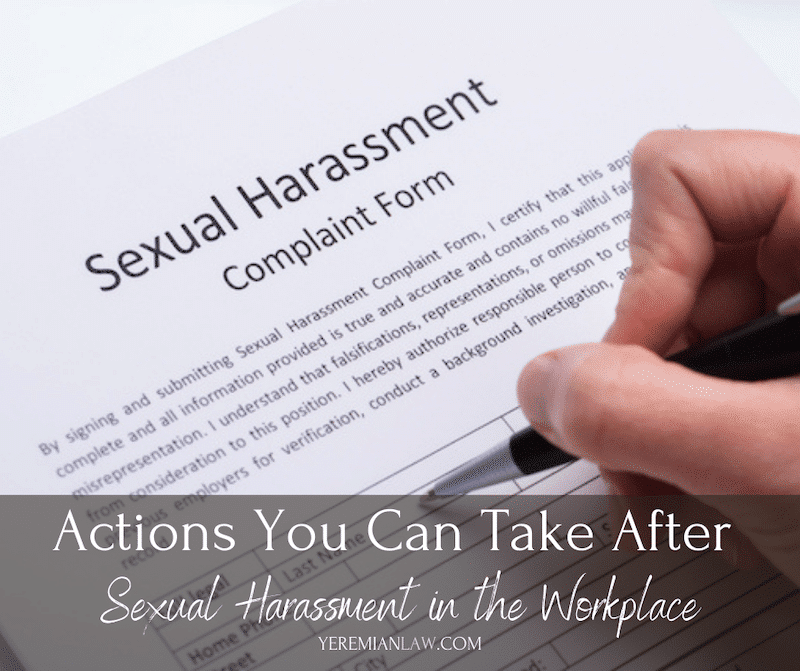Nobody wants to be sexually harassed in the workplace – but unfortunately, it happens far more frequently than we’d like to believe. If you’ve been sexually harassed, it can make you feel powerless and alone at work, but this guide gives you some options on how to handle the situation so you can move forward.
Actions You Can Take After Sexual Harassment in the Workplace
First things first: Sexual harassment is never your fault. It is always, unequivocally, the harasser’s fault. The person or people who sexually harassed you made the choice to do so, and it had nothing to do with your own behavior; they made the choice.
With that said, there are a few things you can do if you’re being sexually harassed at work:
- Tell the harasser to stop.
- Follow your employer’s policies.
- File a complaint with the Equal Employment Opportunity Commission.
- Contact an attorney.
Here’s a closer look at each.
Action #1 to Take After Sexual Harassment in the Workplace: Tell the Harasser to Stop
Sometimes people don’t know their conduct is offensive or harassing, and in situations like this, the best thing you can do is tell the harasser that their conduct is unwelcome. Often, that’s all that needs to happen – the harasser will back off and leave you alone. That may be because the harasser realizes that they were wrong, or it may be because they want to avoid more workplace tension; either way, it’s a great way to stop the offensive conduct.
If you’re not comfortable talking to the harasser about the problem, go to a friend or coworker, a supervisor, or your supervisor’s boss.
Unfortunately, that doesn’t always work. You may need to file a formal complaint with your employer.
Related: California law on sexual harassment at work
Action #2 to Take After Sexual Harassment in the Workplace: Follow Your Employer’s Policies
Many employers have detailed procedures for handling sexual harassment complaints, and if yours is one of them, you should follow them. (You can check your employee handbook or contact a supervisor to learn more about how your company handles these issues.)
Note: Many employers designate a person to whom you’re supposed to report sexual harassment. That’s a great place to start if you’re being harassed and talking to the harasser didn’t resolve the issue.
Generally, you should bring your concerns to your immediate supervisor. If your supervisor is the one harassing you, you should go to your supervisor’s immediate supervisor. It’s incredibly important to ensure that your company’s management is aware that someone is harassing you.
Keep detailed records of the harassment, as well. Write down details about each incident, including dates, names and times, and keep copies of your complaints.
Action #3 to Take After Sexual Harassment in the Workplace: File a Complaint With the EEOC
If your employer can’t – or won’t – resolve your complaint, you can file a complaint with the California Department of Fair Employment and Housing, or DFEH. Alternatively, you can file a complaint with the federal Equal Employment Opportunity Commission, or EEOC, which enforces federal anti-discrimination laws.
If you file a complaint with either agency, it’s automatically “cross-filed” with the other agency. That means you only need to submit one complaint and both agencies will receive it.
The agency may accept your case for investigation; if it does, DFEH or EEOC will require the other party to respond to your complaint. If the agency believes the response isn’t good enough, and that the harasser violated the law, the agency will forward your case to its legal division. Then, the case will go to mediation and you have the opportunity to file a lawsuit.
Related: What constitutes workplace harassment in California?
Action #4 to Take After Sexual Harassment in the Workplace: Contact an Attorney
You always have the freedom to talk to an attorney about your situation. An attorney can help you through the entire process – even if you haven’t yet made a complaint to your supervisor. In fact, you can skip all these steps and go straight to a lawyer for advice.
Do You Need to Talk to a Lawyer About Actions You Can Take After Sexual Harassment at Work?
If you’re not sure what you should do, call us at 818-230-8380 or fill out the form below for a free consultation. We’ll be happy to give you the guidance you need.




